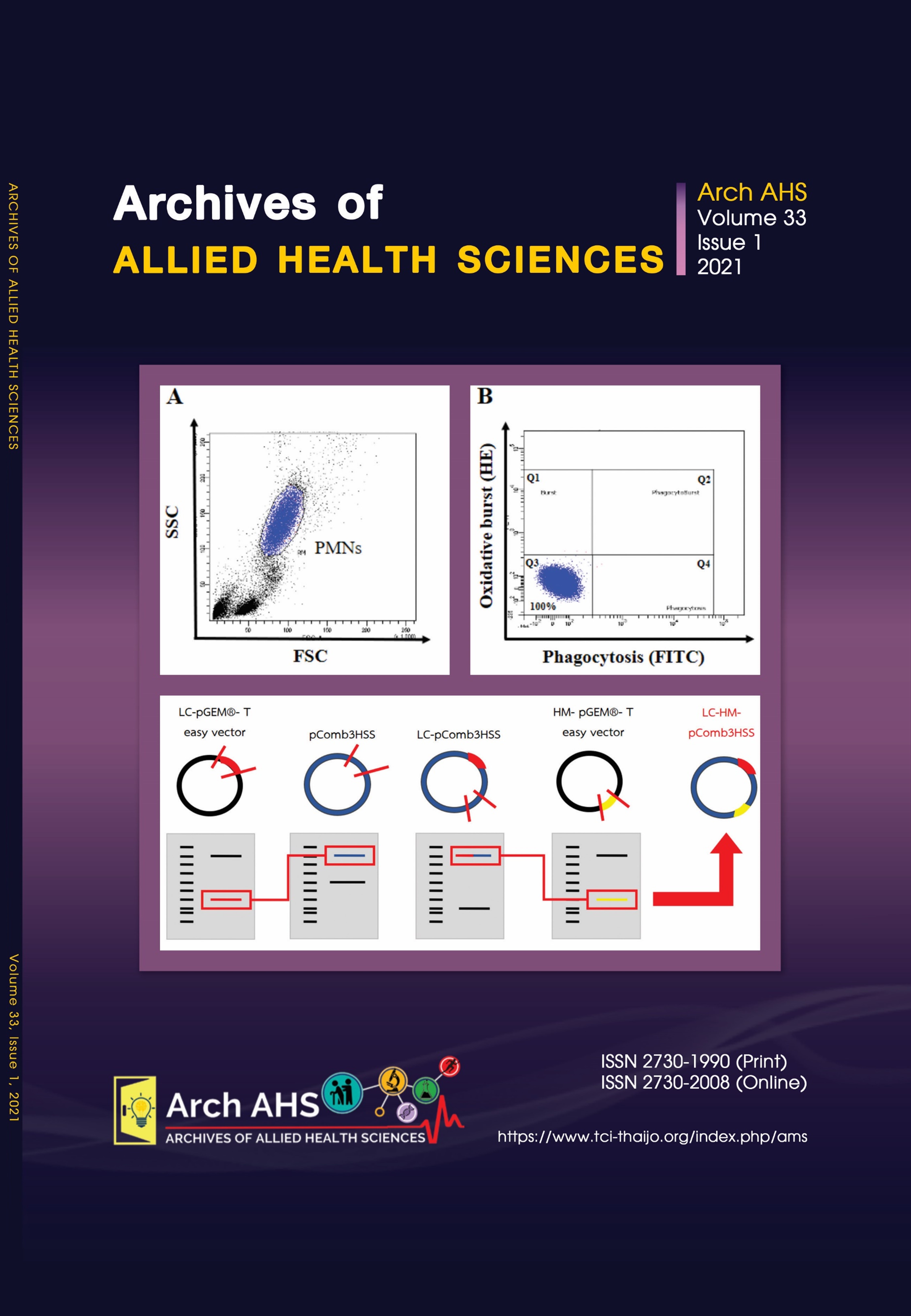Optimization of vitamin C concentration to boost PMN function in healthy individuals
Main Article Content
Abstract
Vitamin C is an antioxidant agent and a promoter of biological functions including immune cells, particularly of neutrophils or polymorphonuclear (PMN) cells, which play a vital role in bacterial infection. The data of vitamin C impacting on PMN function during bacterial phagocytosis in healthy individuals are limited. This study aimed to investigate the optimal concentration and conditions of vitamin C that could enhance PMN phagocytosis and oxidative burst in healthy adult ex vivo using whole blood assay. Whole blood samples from healthy individuals were pre-incubated without and with vitamin C in various concentrations before co-culture with Staphylococcus aureusand detection of the PMN function by fow cytometry. Vitamin C at 20 mM signifcantly increased phagocytosis (p-value = 0.03) and had a trend to signifcantly induce oxidative burst (p-value = 0.06, p-trend = 0.04) at 15 minutes after the bacteria exposure (n = 3), compared to untreated, while vitamin C concentration of 30 mM induced signifcant increase in both phagocytosis (p-value = 0.04) and oxidative burst (p-value = 0.02). We further investigated the boosting effect of vitamin C at 20 mM, as a minimal concentration that can boost phagocytosis, on PMN function in additional 17 healthy participants and found that both phagocytosis and oxidative burst of PMN were signifcantly increased (p-value < 0.0001). In conclusion, vitamin C at 20 mM can enhance PMN function in healthy adults within 15 minutes after exposure of the bacteria. This condition may be benefcial for PMN to eliminate bacterial infection rapidly. Nevertheless, further research in the clinical trial and underlying mechanisms await further studies.
Article Details

This work is licensed under a Creative Commons Attribution-NonCommercial-NoDerivatives 4.0 International License.
References
Mandl J, Szarka A, Banhegyi G. Vitamin C: update on physiology and pharmacology. Br J Pharmacol 2009; 157(7): 1097-110.
Carr AC, Maggini S. Vitamin C and immune function. Nutrients 2017; 9(11): 1211.
Rosales C, Neutrophil. A cell with many roles in infammation or several cell types? Front Physiol 2018; 9: 113.
Bozonet SM, Carr AC. The role of physiological vitamin C concentrations on key functions of neutrophils isolated from healthy individuals. Nutrients 2019; 11(6): 1363.
Liugan M, Carr AC. Vitamin C and neutrophil function: fndings from randomized controlled trials. Nutrients 2019; 11(9): 2102.
Bowie AG, O’Neill LA. Vitamin C inhibits NF-kappa B activation by TNF via the activation of p38 mitogen-activated protein kinase. J Immunol 2000; 165(12): 7180-8.
Nualart FJ, Rivas CI, Montecinos VP, Godoy AS, Guaiquil VH, Golde DW, et al. Recycling of vitamin C by a bystander effect. J Biol Chem 2003; 278(12): 10128-33.
Welsh JL, Wagner BA, van’t Erve TJ, Zehr PS, Berg DJ, Halfdanarson TR, et al. Pharmacological ascorbate with gemcitabine for the control of metastatic and node-positive pancreatic cancer (PACMAN): results from a phase I clinical trial. Cancer Chemother Pharmacol 2013; 71(3): 765-75.
Washko PW, Wang Y, Levine M. Ascorbic acid recycling in human neutrophils. J Biol Chem 1993; 268(21): 15531-5.
Winterbourn CC, Kettle AJ, Hampton MB. Reactive oxygen species and neutrophil function. Annu Rev Biochem 2016; 85: 765-92.
Sharma P, Raghavan SA, Saini R, Dikshit M. Ascorbate-mediated enhancement of reactive oxygen species generation from polymorphonuclear leukocytes: modulatory effect of nitric oxide. J Leukoc Biol 2004; 75(6): 1070-8.
Du J, Cullen JJ, Buettner GR. Ascorbic acid: chemistry, biology and the treatment of cancer. Biochim Biophys Acta 2012; 1826(2): 443-57.
Carr A, Frei B. Does vitamin C act as a pro-oxidant under physiological conditions? Fed Am Soc Exp Biol 1999; 13(9): 1007-24.
Halliwell B. Vitamin C: poison, prophylactic or panacea? Trends Biochem Sci 1999; 24(7): 255-9.


